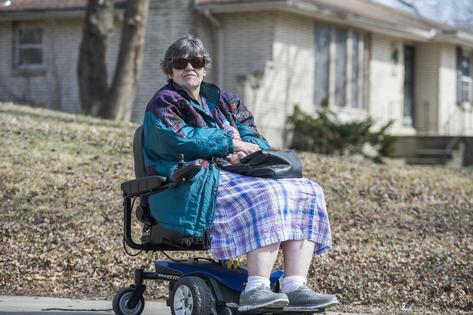'Life and death' choices: Some Missouri seniors struggle to afford drugs after cuts
Published in Senior Living Features
KANSAS CITY, MO. - Marjorie Prunty doesn't have many options left. She's borrowed all the equity she can from her home through a reverse mortgage, and her medications cost about as much as she receives through Social Security.
The 14 prescription drugs she takes are "life and death," but Prunty, 74, of Kansas City, has had to cut out all of her other expenses just to afford them.
"I'm doing it because I don't want to die," Prunty said. "You know how you might have some cans in the back of the cupboard of your house that are gathering dust - well, I'm hardly ever buying food."
Instead, she's eating what she has in the back of her cupboard and her freezer. Her budget was already tight. Now it's "impossible" because she lost prescription drug coverage she had through a program called MORx, which Missouri lawmakers cut from the budget last year.
Some legislators now hope to reinstate the program that covered 50 percent of out-of-pocket prescription drug costs for seniors whose income put them between 85 percent and 185 percent of the federal poverty level.
Without that coverage, Prunty is having to pay those costs, which she estimates total about $16,000 a year.
"I'm not getting any younger or healthier, so it doesn't go down, and it's probably going to go up," Prunty said.
Prunty is one of about 63,000 Missouri seniors who lost their MORx coverage, which helped people who made too much money to qualify for Medicaid but not enough to afford their medication. Without that coverage, some seniors may end up stopping their medications or spreading out the dosage, said James Stowe, director of aging and adult services for the Mid-America Regional Council.
"There aren't a lot of options for this income category," Stowe said.
The Mid-America Regional Council, which serves five counties in the Kansas City area, got numerous calls from seniors when the program was cut last year, but those have tapered off.
"They've either ended their medication or gone back to the doctors and tried to figure out a new pathway for care," Stowe said.
Stowe said his organization and others aim to help seniors live independently at home for as long as possible, but when seniors have to stop treating their chronic conditions because their medication is expensive, they're likely to have a downturn in health. That causes a "domino effect" that leads them to expensive care, like the emergency room or a nursing home.
"Whoever thought that was saving money to cut down on this is going to be really unhappy when they do the research and find out how many of us did go to a nursing home," Prunty said.
The $15 million it takes to run MORx was cut from the budget last year because of cost constraints, said Rep. Justin Alferman, a Hermann Republican and vice chair of the House Budget Committee. The program, however, still covers drugs for those who qualify for both Medicare and Medicaid, like nursing home residents and lower income seniors.
"What we did is we actually saved it for the most vulnerable Missourians who are using the program," Alferman said.
Alferman said some seniors who called seeking help after losing their MORx program were able to find other resources, and he said he would help Prunty if she called his office. He said he's open to restoring the funds if lawmakers can find the resources.
The House Budget Committee advanced the General Assembly's annual budget bills recently, but they still need approval by the full House and Senate.
Rep. Deb Lavender, a St. Louis County Democrat, said she hopes to attach funds for MORx to the budget when the House debates the bills in the coming weeks. She had planned to offer an amendment to fund MORx when the bills were in committee, but most of her amendments were voted down in the marathon markup session.
"This is lives for people in the state of Missouri, and this is how we're spending money," Lavender said. "It's more important to tell me no than to take care of 60,000 people who need help with their prescriptions."
Catherine Edwards, executive director of the Missouri Association of Area Agencies on Aging, said she thought there was an appetite among senators to restore the "short-sighted" cuts.
"I think that at some point members of the General Assembly are going to have to start looking at ways to grow revenue because we're starting to harm our most vulnerable citizens," Edwards said.
Prunty said it's been a miracle she's been able to keep taking her medicine and stay in her home.
"Instead of thinking it's going to be me and the two cats living in the van, I should keep my eyes on faith and say there is a God and he loves us and he loves me and something is going to come through," Prunty said.
She said elected officials don't understand what it means to live in poverty. She encouraged people to picture their loved ones living on nearly nothing.
"Picture me as your grandma," she said.
Visit The Kansas City Star (Kansas City, Mo.) at www.kansascity.com







Comments